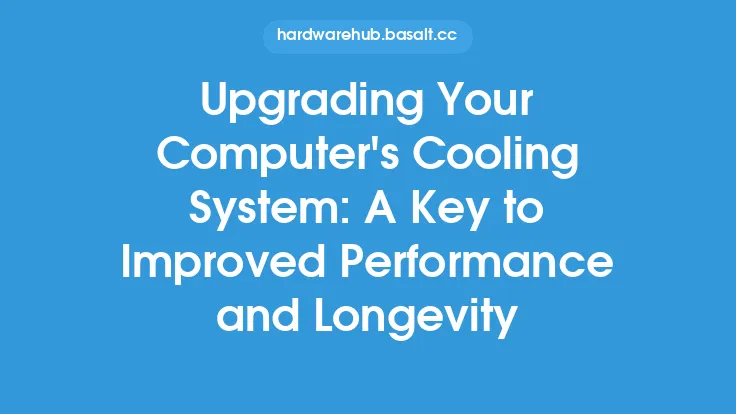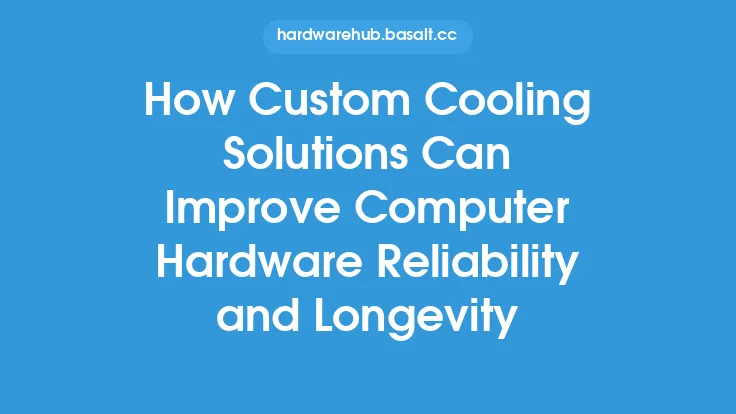Computer hardware is designed to operate within a specific temperature range, and exceeding this range can lead to reduced performance, damage, and even complete failure. The cooling system plays a critical role in maintaining the optimal temperature of the hardware, and its maintenance is essential for ensuring the longevity of the computer. In this article, we will delve into the importance of cooling system maintenance and explore the technical aspects of how it impacts computer hardware.
Introduction to Cooling Systems
Cooling systems are designed to dissipate heat generated by computer hardware, such as central processing units (CPUs), graphics processing units (GPUs), and memory modules. The most common types of cooling systems used in computers are air-based and liquid-based. Air-based cooling systems use fans to circulate air through the system, while liquid-based cooling systems use a liquid coolant to absorb heat from the hardware and transfer it to a radiator, where it is dissipated. Both types of cooling systems require regular maintenance to ensure they operate efficiently and effectively.
The Impact of Poor Cooling System Maintenance
Poor cooling system maintenance can have severe consequences on computer hardware. When the cooling system is not functioning correctly, the hardware can overheat, leading to reduced performance, data corruption, and even complete failure. Overheating can cause the hardware to degrade faster, reducing its lifespan and requiring costly repairs or replacements. Furthermore, overheating can also lead to system crashes, freezes, and errors, resulting in downtime and lost productivity. In extreme cases, overheating can even cause fires or electrical shocks, posing a risk to the user and the surrounding environment.
Technical Aspects of Cooling System Maintenance
From a technical perspective, cooling system maintenance involves ensuring that the system is able to dissipate heat efficiently and effectively. This requires regular cleaning of the cooling system components, such as fans, heat sinks, and radiators, to remove dust and debris that can accumulate and reduce airflow. Additionally, the cooling system's thermal interface material (TIM) must be inspected and replaced as needed to ensure optimal heat transfer between the hardware and the cooling system. The cooling system's fluid dynamics, such as flow rates and pressure drops, must also be monitored and adjusted to ensure that the system is operating within its designed parameters.
Cooling System Components and Their Maintenance
The cooling system consists of several components, each with its own maintenance requirements. The fans, for example, must be cleaned regularly to remove dust and debris that can accumulate and reduce airflow. The heat sinks, which are designed to absorb heat from the hardware, must be inspected and cleaned to ensure that they are able to transfer heat efficiently. The radiators, which are used in liquid-based cooling systems, must be cleaned and inspected to ensure that they are able to dissipate heat effectively. The thermal interface material (TIM), which is used to transfer heat between the hardware and the cooling system, must be inspected and replaced as needed to ensure optimal heat transfer.
Best Practices for Cooling System Maintenance
To ensure the longevity of computer hardware, it is essential to follow best practices for cooling system maintenance. This includes regular cleaning of the cooling system components, inspection of the thermal interface material, and monitoring of the cooling system's fluid dynamics. Additionally, the cooling system must be designed and installed correctly to ensure that it is able to dissipate heat efficiently and effectively. The cooling system must also be compatible with the hardware and the system's operating conditions, such as temperature and humidity. By following these best practices, users can ensure that their cooling system is operating efficiently and effectively, reducing the risk of overheating and extending the lifespan of their computer hardware.
Conclusion
In conclusion, cooling system maintenance is crucial for ensuring the longevity of computer hardware. The cooling system plays a critical role in maintaining the optimal temperature of the hardware, and its maintenance is essential for preventing overheating, reducing performance, and extending the lifespan of the computer. By understanding the technical aspects of cooling system maintenance and following best practices, users can ensure that their cooling system is operating efficiently and effectively, reducing the risk of overheating and extending the lifespan of their computer hardware. Regular maintenance of the cooling system components, inspection of the thermal interface material, and monitoring of the cooling system's fluid dynamics are all essential for ensuring the optimal performance and longevity of computer hardware.





